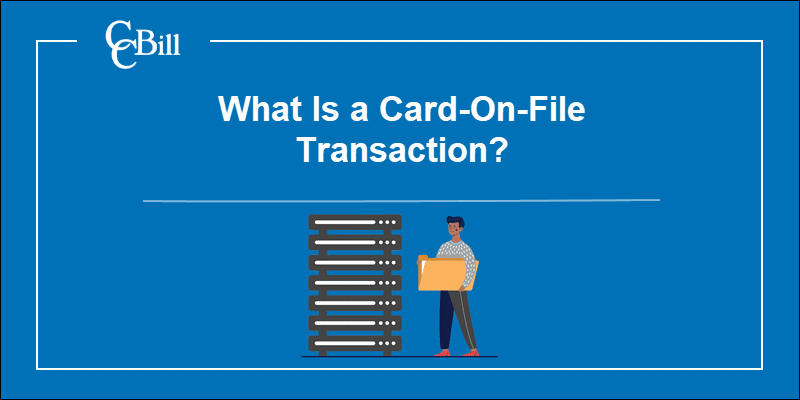Introduction
Customers are tired of being asked to jump through hoops every time they pay online. Merchants need to streamline payment flows and reduce the number of steps it takes to complete a payment but also maintain compliance and safety standards.
Card-on-file transactions require customers to provide their payment details only once. Merchants can use this data to automate payments and initiate new transactions with no or minimal customer input.
Find out how card-on-file transactions work and why they result in higher conversion rates.

What Is Card-On-File Transaction?
Card-On-File (COF) transactions are payments initiated using stored cardholder data. Customers can authorize merchants to collect their payment card data, understanding that the data is going to be used to expedite future transactions.
Card-on-file transactions allow merchants to charge customers without additional payment authentication. A prime example of this type of charge is a recurring subscription.
Card-On-File Transaction Types
Once a merchant collects the customer’s payment data, they can initiate COF transactions in several different ways depending on the payment terms:
| Card-On-File Transaction Type | Description |
|---|---|
| Recurring Payments | Customers accept and agree to the payment terms during the initial transaction. They are subsequently charged in recurring merchant-defined intervals (monthly, quarterly, yearly, etc.). Membership websites, streaming services, financial institutions, and utility companies use recurring COF transactions to charge customers for their services. |
| Installments | Merchants who sell high-value items attract customers by offering installment payments. Customers are required to make a partial initial payment and pay the rest in portions over a fixed period. Technical and sporting equipment, furniture, collectibles, and other luxury goods are usually sold in installments. |
| Incremental | Card-on-file transactions are ideal for facilitating cross-sells and upsells. For example, merchants can easily charge customers for additional services or products during a contract period, like migrating to a higher subscription plan. |
| Reauthorization | When the total price of a service or product is not predefined, like with an open hotel reservation or car rental, merchants can trigger a card-on-file transaction to make additional charges for the services rendered. |
| Delayed | A delayed COF transaction occurs when a merchant initiates a charge in addition to the primary charge. This can be for the payment of fines, damages, or other overdue fees. |
| Resubmission | If the first payment attempt is denied due to insufficient funds, a merchant may resubmit the transaction using payment data from the initial transaction. The period during which a resubmission is valid depends on the card issuer and card brand rules. |
| No Show | Customers leave their payment card details when making hotel reservations or booking airline tickets. The hotel or airline may charge a partial or total amount if the customer does not show up for their reservation or appointment. |
How Does Card on File Work?
A card-on-file billing process relies on the agreement established between the merchant and customer. Businesses must receive customers’ consent to the payment terms before initiating card-on-file transactions.

The process includes the following steps:
- A customer provides payment details (card or bank account information) for the initial transaction. Online merchants usually collect customer payment data using a payment form.
- Well-designed payment forms require customers to actively confirm that they understand and accept the payment terms. Cardholders are asked to check a confirmation box to agree with the terms and conditions and permit merchant-initiated transactions (MIT).
- The customer-initiated transaction (CIT) serves as authorization for both the initial and subsequent MITs.
- The merchant or payment gateway stores and tokenizes the cardholder’s data to facilitate automated transactions.
- An MIT transaction is initiated, and the funds are transferred to the merchant account.
- The customer receives a notification/invoice that confirms the payment was completed.
Merchant-initiated transactions only take place after the initial CIT. The customer-initiated transaction authorizes a merchant to initiate new transactions without additional payment validation or the cardholder’s presence.
Card-On-File Benefits
Card-on-file transactions have several clear benefits for both merchants and customers:
- Stable Revenue Stream - Automated customer charges enable merchants to forge long-term business plans due to consistent and predictable revenue.
- Automated Payments - Merchants do not need to micromanage customer payments. Using a payment processor ensures that all payments are authorized on time and that potential errors are reduced to a minimum.
- Flexible Payment Terms - Merchants can change the terms of the agreement if the customer accepts, and no new collection of payment details is required. Even customers can initiate such changes by, for example, deciding to migrate to a premium tier.
- Lower Abandonment Rates - Customers abandon payments if they are unsure how to complete a payment form, don’t have all the requested information, or because of a technical issue. COF transactions eliminate human-induced errors from the payment process.
- Frictionless Payment Flow - Customers enter their payment information only during the first CIT. The merchant can automatically collect the funds without bothering the customer by requesting additional information.
- New Revenue Opportunities - Trending financial services like Buy Now, Pay Later, and ecommerce approaches such as omnichannel retail and headless commerce would not be possible without collecting and tokenizing customer payment data.
What Merchants Need to Know About Card-On-File Transactions
Merchants planning to collect payment card data and initiate COF transactions must take several things under consideration:
- Data Security and Privacy Laws - Laws and regulations differ from country to country. Companies that intend to sell products and services globally can quickly run into issues if collecting customer payment data. Understanding and complying with local and international data protection regulations like PSD2, GDPR, CCPA, and KYC is essential.
- PCI Compliance - The procedural and technical requirements outlined in the PCI DSS protect cardholders and their data from potential payment fraud and data misuse. Merchants that are not PCI compliant cannot process card payments unless they use a payment gateway that complies with PCI data security standards.
- Technical Implementation - Building a proprietary automated payment authentication and processing system is expensive and time-consuming. Merchants looking to process COF transactions need to integrate third-party solutions that help them process recurring payments, introduce advanced security features, and manage risks associated with payment processing. Using the services of an established Payment Services Provider (PSP), like CCBill, is a fast and cost-effective way to get all the necessary solutions in one place.

- Customer Consent - Merchants need to obtain active cardholder consent before storing their payment information. They must also inform cardholders how their data is going to be used and ensure it is never used for any other purposes. If there are any changes to the terms and conditions, cardholders need to be notified immediately and given the option to accept or opt out.
- Pre-Payment and Card Expiration Notices - It is a good business practice to inform customers about due payments and card expiration dates in advance. Allowing customers to prepare the necessary funds, update their payment data, or renew a payment card helps merchants maintain a consistent cash flow and enables customers to avoid potential fees.
- Straightforward Payment Policies - Customers need to be reassured that their data is going to be safe and that they do not feel cheated by the subsequent charges. The general terms and conditions must be written clearly and concisely without ambiguities or hidden costs.
Conclusion
You now know how card-on-file transactions work and the value of stored cardholder data.
Initiating payments without validating the payment instrument for every transaction is a huge business opportunity.
Take a step in the right direction by implementing a reliable automated billing system, secure and dynamic payment forms, and advanced API solutions.
